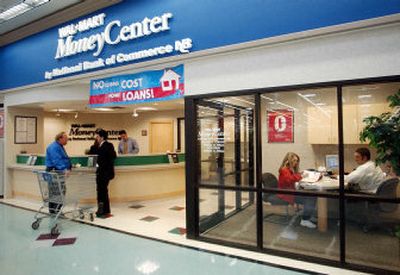Wal-Mart tries again to launch bank

BENTONVILLE, Ark. – Wal-Mart Stores Inc., ever looking for ways to expand its already huge empire, is asking the government for permission to move into an entirely different industry: running its own in-house bank.
The world’s largest retailer will ask the Federal Deposit Insurance Corp. Monday for permission to open a bank that can process millions of checks and credit card payments each month. The company says it’s not interested in running a consumer bank as well, but some of its opponents still fear such a step could hurt local banks much like the mom-and-pop stores were during Wal-Mart’s rapid expansion.
This is Wal-Mart’s fourth bid at running a bank – and its request unleashed an unprecedented flood of comments to the FDIC. In response, the FDIC scheduled its first public hearings ever on a bank application.
“It’s a landmark battle in both U.S. business and financial services history,” said Jerry Comizio, a financial services lawyer for Thacher Proffitt & Wood LLP in Washington, D.C., and a former senior attorney with the Securities and Exchange Commission and deputy general counsel of the U.S. Department of the Treasury’s Office of Thrift Supervision.
Wal-Mart says consumers and retail banks have nothing to fear. It pledges to stay out of branch banking and says it will not provide consumer lending. About 300 institutions operate branches in 1,150 Wal-Mart stores and the company says it doesn’t want to compete with them.
For opponents, those assurances ring hollow.
“There is reason to believe that these (Wal-Mart) plans could be expansive. Wal-Mart has attempted on several occasions to enter the full-service banking business,” said Art Johnson, head of government relations for the American Bankers Association, in testimony prepared for Monday’s hearing. “The ABA believes that banking is too important to the nation to try such a risky experiment.”
Wal-Mart says it can save money if allowed to operate an in-house bank to handle the 140 million credit, debit card and electronic check payments it handles each year. At present, it pays outside companies to handle those transactions.
In the past five years, Wal-Mart has tried without success to buy financial institutions in California and Oklahoma and partner with a bank in Canada. The California legislature, Congress and regulators blocked those deals over worries about big retailers getting into banking without full bank supervision.
This time, Wal-Mart is applying for a state charter to open a special type of bank called an industrial loan corporation in Utah, where other companies including rival Target Corp. already have one. Target uses its Utah industrial bank to issue credit cards for corporate customers and says it has no plans to expand that business.
The charter needs approval from the FDIC, which would supervise and insure its deposits. ILCs are not regulated by the Federal Reserve, which has oversight over traditional banks.
While the Federal Reserve supervises the entire range of a bank’s business including its holding company, state and federal oversight over ILCs does not extend to the commercial companies that run them. Opponents say this means that an ILC’s owner can take more business risks than a regular bank and potentially endanger deposits insured by the FDIC.
The first FDIC hearing will be held Monday and Tuesday in Arlington, Va., and a second one on April 25 in Overland Park, Kan.
Wal-Mart’s supporters in the hearings include the American Financial Services Association, which groups credit card issuers, mortgage and car loan providers and other consumer lenders, and the Salvation Army, which says it will be a “character witness” to talk about Wal-Mart’s support for charities and disaster relief.
Concerns are twofold. One is the mixing of banking and commerce – parts of the economy that have traditionally been separate. The other is concern that a Wal-Mart bank could swallow local banks with its national presence and deep pockets, outcompeting even large institutions such as Bank of America, Chase and Wachovia that have also grown at the expense of local ownership.